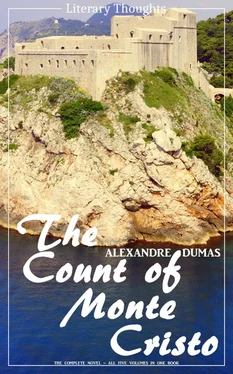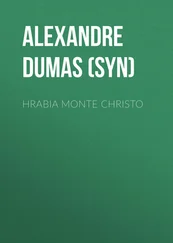"Ah," said Villefort, "this seems to me the truth. If you have been culpable, it was imprudence, and this imprudence was in obedience to the orders of your captain. Give up this letter you have brought from Elba, and pass your word you will appear should you be required, and go and rejoin your friends.
"I am free, then, sir?" cried Dantes joyfully.
"Yes; but first give me this letter."
"You have it already, for it was taken from me with some others which I see in that packet."
"Stop a moment," said the deputy, as Dantes took his hat and gloves. "To whom is it addressed?"
"To Monsieur Noirtier, Rue Coq-Heron, Paris." Had a thunderbolt fallen into the room, Villefort could not have been more stupefied. He sank into his seat, and hastily turning over the packet, drew forth the fatal letter, at which he glanced with an expression of terror.
"M. Noirtier, Rue Coq-Heron, No. 13," murmured he, growing still paler.
"Yes," said Dantes; "do you know him?"
"No," replied Villefort; "a faithful servant of the king does not know conspirators."
"It is a conspiracy, then?" asked Dantes, who after believing himself free, now began to feel a tenfold alarm. "I have, however, already told you, sir, I was entirely ignorant of the contents of the letter."
"Yes; but you knew the name of the person to whom it was addressed," said Villefort.
"I was forced to read the address to know to whom to give it."
"Have you shown this letter to any one?" asked Villefort, becoming still more pale.
"To no one, on my honor."
"Everybody is ignorant that you are the bearer of a letter from the Island of Elba, and addressed to M. Noirtier?"
"Everybody, except the person who gave it to me."
"And that was too much, far too much," murmured Villefort. Villefort's brow darkened more and more, his white lips and clinched teeth filled Dantes with apprehension. After reading the letter, Villefort covered his face with his hands.
"Oh," said Dantes timidly, "what is the matter?" Villefort made no answer, but raised his head at the expiration of a few seconds, and again perused the letter.
"And you say that you are ignorant of the contents of this letter?"
"I give you my word of honor, sir," said Dantes; "but what is the matter? You are ill – shall I ring for assistance? – shall I call?"
"No," said Villefort, rising hastily; "stay where you are. It is for me to give orders here, and not you."
"Monsieur," replied Dantes proudly, "it was only to summon assistance for you."
"I want none; it was a temporary indisposition. Attend to yourself; answer me." Dantes waited, expecting a question, but in vain. Villefort fell back on his chair, passed his hand over his brow, moist with perspiration, and, for the third time, read the letter.
"Oh, if he knows the contents of this!" murmured he, "and that Noirtier is the father of Villefort, I am lost!" And he fixed his eyes upon Edmond as if he would have penetrated his thoughts.
"Oh, it is impossible to doubt it," cried he, suddenly.
"In heaven's name!" cried the unhappy young man, "if you doubt me, question me; I will answer you." Villefort made a violent effort, and in a tone he strove to render firm, –
"Sir," said he, "I am no longer able, as I had hoped, to restore you immediately to liberty; before doing so, I must consult the trial justice; what my own feeling is you already know."
"Oh, monsieur," cried Dantes, "you have been rather a friend than a judge."
"Well, I must detain you some time longer, but I will strive to make it as short as possible. The principal charge against you is this letter, and you see" – Villefort approached the fire, cast it in, and waited until it was entirely consumed.
"You see, I destroy it?"
"Oh," exclaimed Dantes, "you are goodness itself."
"Listen," continued Villefort; "you can now have confidence in me after what I have done."
"Oh, command, and I will obey."
"Listen; this is not a command, but advice I give you."
"Speak, and I will follow your advice."
"I shall detain you until this evening in the Palais de Justice. Should any one else interrogate you, say to him what you have said to me, but do not breathe a word of this letter."
"I promise." It was Villefort who seemed to entreat, and the prisoner who reassured him.
"You see," continued he, glancing toward the grate, where fragments of burnt paper fluttered in the flames, "the letter is destroyed; you and I alone know of its existence; should you, therefore, be questioned, deny all knowledge of it – deny it boldly, and you are saved."
"Be satisfied; I will deny it."
"It was the only letter you had?"
"It was."
"Swear it."
"I swear it."
Villefort rang. A police agent entered. Villefort whispered some words in his ear, to which the officer replied by a motion of his head.
"Follow him," said Villefort to Dantes. Dantes saluted Villefort and retired. Hardly had the door closed when Villefort threw himself half-fainting into a chair.
"Alas, alas," murmured he, "if the procureur himself had been at Marseilles I should have been ruined. This accursed letter would have destroyed all my hopes. Oh, my father, must your past career always interfere with my successes?" Suddenly a light passed over his face, a smile played round his set mouth, and his haggard eyes were fixed in thought.
"This will do," said he, "and from this letter, which might have ruined me, I will make my fortune. Now to the work I have in hand." And after having assured himself that the prisoner was gone, the deputy procureur hastened to the house of his betrothed.
Chapter 8 – The Chateau D'If.
The commissary of police, as he traversed the ante-chamber, made a sign to two gendarmes, who placed themselves one on Dantes' right and the other on his left. A door that communicated with the Palais de Justice was opened, and they went through a long range of gloomy corridors, whose appearance might have made even the boldest shudder. The Palais de Justice communicated with the prison, – a sombre edifice, that from its grated windows looks on the clock-tower of the Accoules. After numberless windings, Dantes saw a door with an iron wicket. The commissary took up an iron mallet and knocked thrice, every blow seeming to Dantes as if struck on his heart. The door opened, the two gendarmes gently pushed him forward, and the door closed with a loud sound behind him. The air he inhaled was no longer pure, but thick and mephitic, – he was in prison. He was conducted to a tolerably neat chamber, but grated and barred, and its appearance, therefore, did not greatly alarm him; besides, the words of Villefort, who seemed to interest himself so much, resounded still in his ears like a promise of freedom. It was four o'clock when Dantes was placed in this chamber. It was, as we have said, the 1st of March, and the prisoner was soon buried in darkness. The obscurity augmented the acuteness of his hearing; at the slightest sound he rose and hastened to the door, convinced they were about to liberate him, but the sound died away, and Dantes sank again into his seat. At last, about ten o'clock, and just as Dantes began to despair, steps were heard in the corridor, a key turned in the lock, the bolts creaked, the massy oaken door flew open, and a flood of light from two torches pervaded the apartment. By the torchlight Dantes saw the glittering sabres and carbines of four gendarmes. He had advanced at first, but stopped at the sight of this display of force.
"Are you come to fetch me?" asked he.
"Yes," replied a gendarme.
"By the orders of the deputy procureur?"
"I believe so." The conviction that they came from M. de Villefort relieved all Dantes' apprehensions; he advanced calmly, and placed himself in the centre of the escort. A carriage waited at the door, the coachman was on the box, and a police officer sat beside him.
Читать дальше












